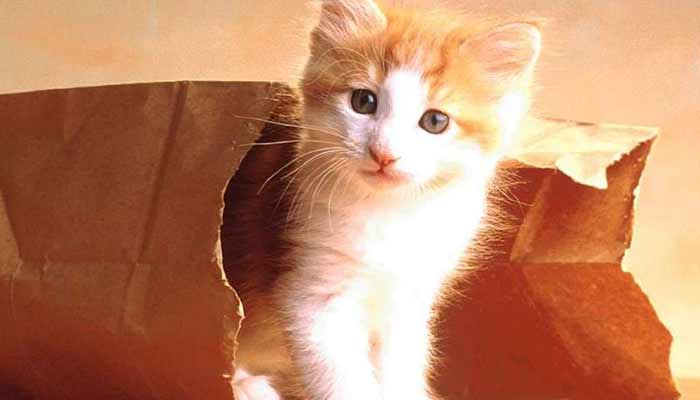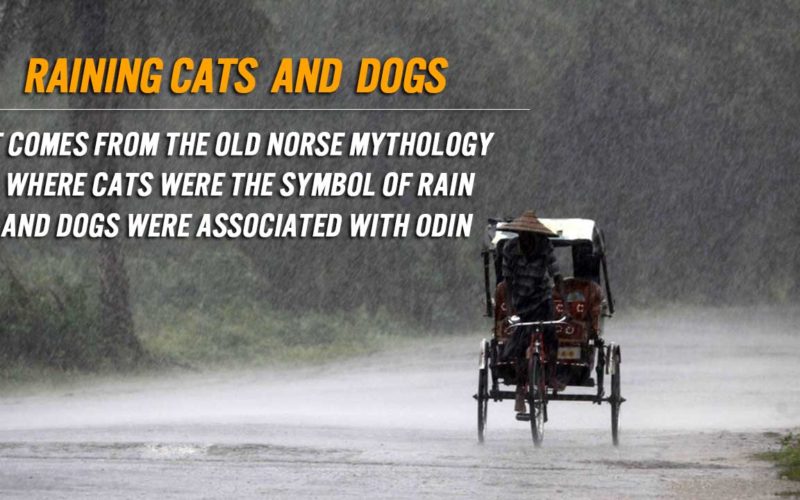- 753shares
- Share
- Tweet
- Facebook Messenger
Today, idioms have become a part of our daily conversation. These idioms often help us emphasize what we want to say to one another.
But interestingly, even though we use these idioms daily, still most of us don’t know how these idioms became a part of our language.
Here is a list of some of our favorite idioms and their origins.
1. Turn a blind eye

When do we use it: We use the term when someone pretends not to notice.
The origin: During the battle of Copenhagen, Admiral Horatio Nelson deliberately raised his telescope to his blind eye, so that he could not see the orders from his superior. This incident gave birth to this famous idiom.
2. Raining cats and dogs

When do we use it: This term is used to describe heavy rains.
The Origin: This idiom comes from the old Norse mythology where cats were the symbol of rain. Dogs, on the other hand, were directly related to Odin, who was the God of storm and wind. Thus, leading to the popular phrase.
3. Running amok

When do we use it: We use when something or someone goes out of control and behaves in an unrestrained manner.
The Origin: It actually comes from Malaysia, it referred to a peculiar mental affliction which made even sane people go on a killing spree.
4. Paint the town red

When do we use it: When we enjoy ourselves to the fullest by going around the town and exploring new and exciting places.
The origin: This phrase became a part of our vocabulary after troublemaker Marquis De Waterford and his accomplices, in the year 1837, spent an evening vandalizing the English town, Melton Mowbray. They not only vandalized many buildings but also painted them red.
5. Let the cat out of the bag

When do we use it: When someone spills out a secret
The origin: This phase was recorded in a book review in a 1760 edition of London Magazine.
The origin of this phrase goes way back to the 16th century when all the livestock were dealt in the open market. In those days pigs were given to customers in a bag and often sellers used to fool the customers by giving a cat instead of a pig.
6. Kick the bucket

When do we use it: We use this term when someone dies.
The origin: Though nobody is absolutely certain about its origin, but it is believed that it originates from the way livestock used to be executed. They were tied to a wooden structure known as the bucket and the way they used to throw their legs led to the birth of this phrase.
7. Bite the bullet

When do we use it: We use it describe a task which might be risky or challenging.
The origin: Before anesthesia was invented, the surgeons used to give their patients alcohol and a lead bullet to chew. Thus giving birth to the star.
8. Extend the Olive branch

When do we use it: When someone decides to make peace with someone else.
The origin: This phrase has biblical origins. Olive was seen as a symbol of peace. In Genesis, a dove brings an olive branch to Noah to indicate that God’s anger had died down.
9. Skeleton in the closet

When do we use it: The phrase is often used to describe a shameful secret which someone does not want to reveal.
The origin: It is believed that prior to 1832, doctors were not allowed to get access of the corpses easily, so they used to hide skeletons in their cupboards for study and research.
10. Feeling under the weather

When do we use it: When one falls ill or is not feeling well.
The origin: This has nautical origins, just like many of our phrases. When a person in the crew used to feel unwell or suffer from sea sickness. The person was advised to go down below deck to recover.
11. Get up on the wrong side of the bed

When do we use it: It is used when someone is grumpy or unhappy in the morning.
The origin: This phrase actually comes from ancient Rome. In ancient Rome, getting out of bed on the left side was considered a bad sign.
12. Hands down

When do we use it: It is used when achieves something like a victory, without much effort
The origin: It is believed that the phrase came into existence from horse racing in Britain. When a jockey used to have a comfortable lead close to the finish line, he used to take his hands off. Thus giving birth to the phrase.
13. Show your true color

When do we use it: When someone conceals his real identity or motives from others.
The origin: Earlier pirates used to use flags of different countries in order to gain access to their territory and only when they reached near their target, they would hoist their real flag. This led to the birth of the often used phrase.
Well, now you know how it all began.
- 753shares
- Share
- Tweet
- Facebook Messenger




